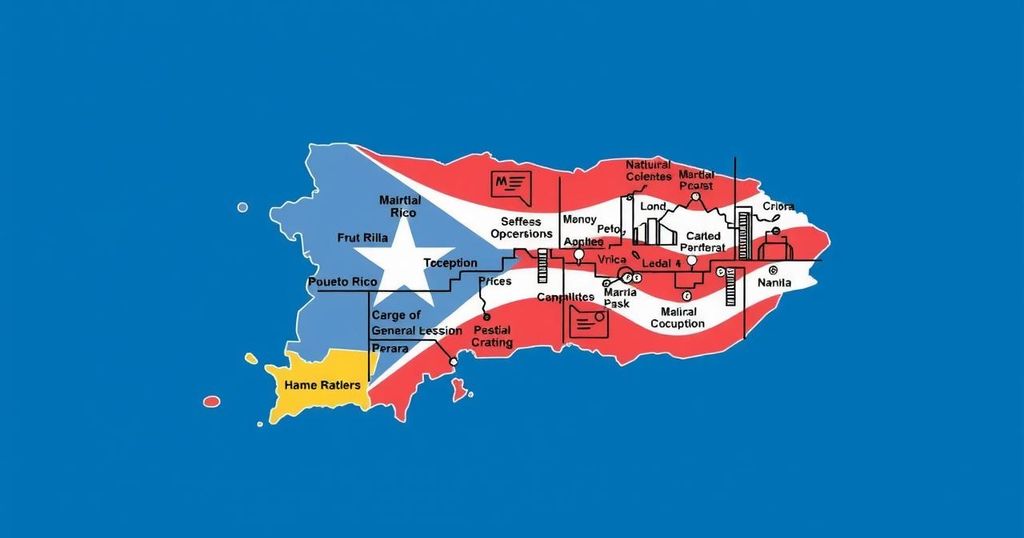Historic Elections in Puerto Rico Promise Significant Political Changes

Puerto Rico’s elections on November 2, 2024, may redefine its political landscape with significant gubernatorial candidates. Jenniffer González aims for a historic third term for the pro-statehood New Progressive Party, while Juan Dalmau could pave the way for a candidate outside the established parties. Voter turnout, driven by demand for change amid economic and societal issues, remains crucial.
On November 2, 2024, Puerto Rico embarked on a noteworthy election characterized by potentially historic implications for the island’s political landscape. The gubernatorial contest featured prominent candidates: Jenniffer González of the pro-statehood New Progressive Party and Juan Dalmau of the Puerto Rico Independence Party, along with Jesús Manuel Ortiz of the Popular Democratic Party and Javier Jiménez of Project Dignity. This election could position González as the first candidate to achieve three consecutive terms for her party, or it could usher in Dalmau as the first candidate not aligned with the traditional dominant parties. The electorate exhibited notable enthusiasm, standing in long lines despite inclement weather, highlighting a demand for change in the face of ongoing societal challenges such as economic struggles and infrastructure inadequacies. In a relevant context, the electoral process is compounded by a nonbinding referendum that presents voters with options regarding Puerto Rico’s political status, including statehood and independence. Moreover, Puerto Ricans shall have the opportunity to express their preferences in a symbolic vote for U.S. presidential candidates, amplifying the complexity of the day’s electoral significance. The elections represented a marked shift from past cycles dominated by the New Progressive Party and the Popular Democratic Party, as newer parties gained traction amidst public dissatisfaction. These elections reflect a growing sentiment of fatigue with the longstanding bipartisanship that has shaped Puerto Rico’s governance. Electoral authorities anticipated delayed results due to the counting of numerous early and absentee votes, coupled with allegations of electoral improprieties. The ongoing challenges Puerto Rico faces, such as chronic energy outages and public service issues, dominate the concerns of the voters, signifying a yearning for substantive change. There exists an acknowledgment from candidates like Jenniffer González, who advocates for equality in treatment despite Puerto Rico’s status as a U.S. territory, emphasizing the island’s need for reforms across various sectors, including healthcare and education. The election’s outcome is pivotal, not only for the immediate future of Puerto Rico but also in determining the trajectory of its political status as influenced by ongoing discussions with the U.S. Congress.
The general election in Puerto Rico on November 2, 2024, represented a significant moment in the island’s political history, potentially redefining its governance and political alignment. For many decades, the New Progressive Party and the Popular Democratic Party have dominated the vote share, often accounting for over 90% of the total in past elections. However, shifting dynamics, driven by economic crises and societal unrest, catalyzed the emergence of new political parties such as the Citizen Victory Movement and Project Dignity, presenting voters with alternatives. This election is further complicated by a nonbinding referendum on Puerto Rico’s future political status and local electoral expressions regarding U.S. presidential candidates, intricately linking island politics to broader American governance.
The elections in Puerto Rico on November 2, 2024, hold the promise of historic change, signaling a potential departure from the entrenched bipartisanship largely characterized by the New Progressive Party and the Popular Democratic Party. As voters navigate significant issues like chronic power outages, housing shortages, and economic instability, the joint focus on the gubernatorial race and the status referendum offers an opportunity for profound political renewal. The active engagement of the electorate in this election reflects a collective aspiration for reform and inclusion, highlighting the evolving nature of political identity in Puerto Rico.
Original Source: apnews.com







